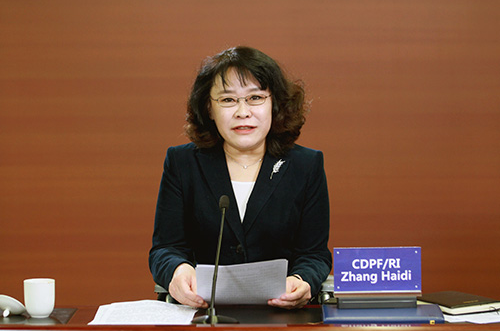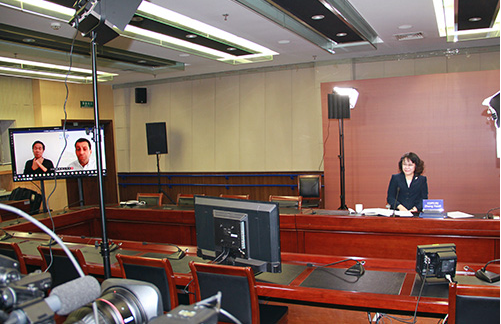
Zhang Haidi, chairwoman of the China Disabled Persons’ Federation (CDPF) and President of Rehabilitation International, delivers a keynote speech at the ESCAP videoconference on“Protecting and Empowering Persons with Disabilities in the Context of the COVID-19 Pandemic" in Beijing on May 15. [Photo/cdpf.org.cn]
At the invitation of the United Nations Economic and Social Commission for Asia and the Pacific (ESCAP), Zhang Haidi, chairwoman of the China Disabled Persons’ Federation (CDPF) and President of Rehabilitation International, delivered a speech at the ESCAP videoconference on“Protecting and Empowering Persons with Disabilities in the Context of the COVID-19 Pandemic" in Beijing on May 15.
Zhang pointed out in her speech that at the beginning of the outbreak, the CDPF had called on the whole of society to give priority to persons with disabilities in preventing the pandemic. The CDPF has assisted the government in safeguarding the lives of persons with disabilities in difficulty, and is particularly concerned about the care institutions for the severely disabled.
Because of that concern more than 2,000 persons with disabilities in more than 100 care institutions in Zhumadian, Henan province, have not been infected up to now. The CDPF provided timely care services for persons with disabilities and children in need of guardianship and care, used online resources to help children with disabilities study, provided guidance on family rehabilitation, provided mental health services for persons with disabilities, and created conditions for more persons with disabilities to receive technical training to lay a foundation for employment and entrepreneurship after the pandemic.
Zhang stressed that persons with disabilities are one of the groups most affected by the COVID-19 pandemic and that the barriers and inequalities they face are further exacerbated by the pandemic, demanding more attention and support from the international community. She called on the international community to pay more attention to the rights and interests of persons with disabilities in the prevention and control of the pandemic, which received positive responses.

Zhang Haidi, chairwoman of the China Disabled Persons’ Federation (CDPF) and President of Rehabilitation International, attends the ESCAP videoconference on“Protecting and Empowering Persons with Disabilities in the Context of the COVID-19 Pandemic" in Beijing on May 15. [Photo/cdpf.org.cn]
She calls for respect for the right to health and the right to life of persons with disabilities to be guaranteed at all times in the prevention and control of the pandemic, especially to ensure that the elderly, women and children with disabilities enjoy equal rights and related services during the pandemic. International cooperation should be strengthened for persons with disabilities to address the pandemic and achieve the goal of leaving no one behind.
Kaveh Zahedi, deputy executive secretary of ESCAP, and María Soledad Cisternas Reyes, special envoy on disability and accessibility, attended the meeting and made statements.
The meeting was of special importance as it was held on the eve of the National Day for Helping the Disabled. The conference was organized by ESCAP to call on governments to fully consider the needs of persons with disabilities in their anti-pandemic policies and measures, and to promote greater cooperation among governments, organizations of persons with disabilities, and social groups to promote the rights and empowerment of persons with disabilities in the context of the COVID-19 pandemic.
More than 300 representatives from United Nations agencies, national authorities and organizations of persons with disabilities in the Asia-Pacific region attended the meeting.

